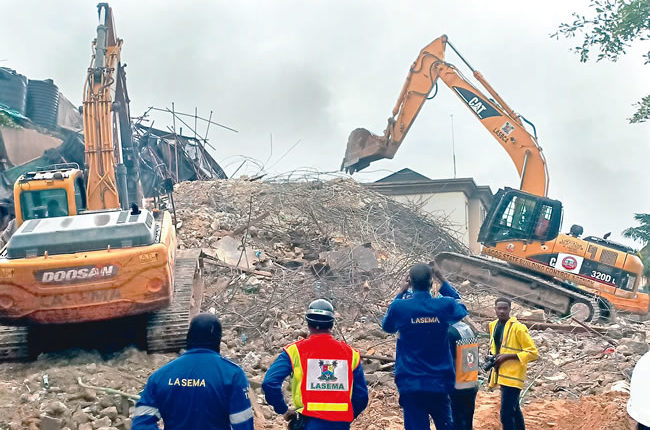***urge presidential candidates to prioritise physical planning
The President, of the Nigerian Institute of Town Planners (NITP), Nathaniel Atebije, has urged the federal government to consider introducing capital punishment for anyone found violating building ethics leading to building collapse.
According to the association, the death penalty for offenders will possibly scare people in the production process of buildings and make them strictly comply with extant regulations.
Atebije made the call while reacting to the incessant building collapse across the country at the quarterly press briefing of the association on Thursday, in Abuja
He said: “The pain is that many times the victims of these building collapses lose their lives. We may not know what these people who are killed during this collapse might have contributed to the economy of the country.
“People who are working on building sites are also humans but because of the value we attached to the lives of Nigerians, that is why we are careless about the people who are working for us. With all due respect, maybe people who are also building these houses might not have had a genuine source of income, if not it doesn’t make any sense to go and invest in a building that will collapse.
“So that is why we are saying life is life and let it be life for life. In some countries, when a man is found to be corrupt, he is killed even though that might be very drastic. We may not be advocating for that but let there be a punishment that will be enough to deter other people from committing such offence.”
Ahead of the 2023 general elections,
Atebije observed that having studied the manifestos of the presidential candidates, they are loaded with ideas and ideals of activities and programmes.
He, however, expressed concerns over the priority given to urban and regional planning by the candidates.
Atebije added: “Looking through the plans of action of the political parties, there are a few indications of positive intentions for building a prosperous country.
“One of the manifestos indicated that if they are voted into power, they will ensure full compliance with town planning and environmental laws and edicts. Another party intends to embrace village and urban renewal programmes; encourage public-private-partnership (PPP) in housing development; improve and beautify the environment by establishing open space, parks and gardens for recreational purposes in cities, towns and within housing estates; and will not only provide affordable housing but will seek to build more inclusive communities comprising a mix of different income brackets and promises that their housing vision will be guided by equity and inclusiveness.
“These indeed are good thoughts. But we are worried about seeing the location of these proposals in their documents. If the arrangement of the document would be the logic and priority of implementation, then urban and regional planning will be the last point of call. And if that becomes the reality, infrastructure, education, housing and all other developments would be carried out before they come to urban and regional planning.
“This would result in our perpetually practised “confused growth or growth without effective development syndrome” It will result in mids-investment and under-development. This is why it appears that this nation has been long on the journey to development but yet not so close. Our efforts have gone so far but we are still not so close to hope to turn our dreams into reality.”
Atebije called on the candidates to review their manifestos to reflect the critical role of physical planning in their agenda; and to carry out development in line with the provisions of the Nigerian Urban and Regional Planning, 1992 as amended in 2004.

































